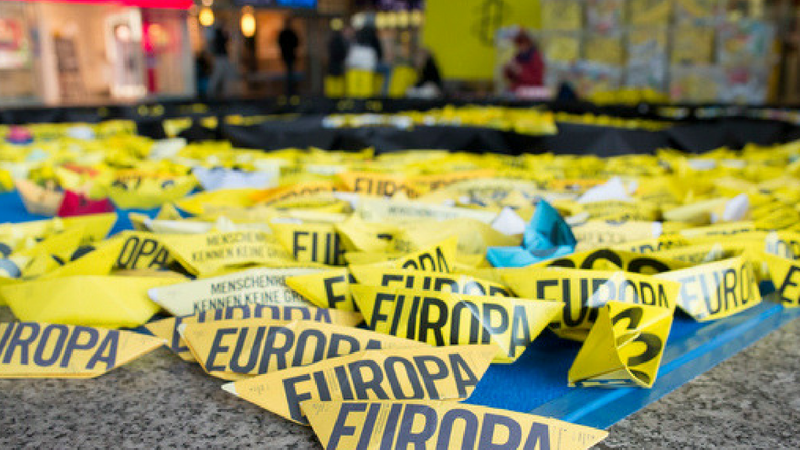Malta and Italy’s policies are to blame for the deaths of 721 people at sea in June and July, Amnesty International said.
In a damning report the human rights group said European agreements with Libya as well as Malta and Italy’s hostility towards migrant rescue ships were having a devastating impact
Amnesty International called on the Maltese and Italian governments to refrain from misusing criminal law against NGOs rescuing migrants in the Mediterranean sea and stop the campaign of “innuendo” and “insinuation” against them.
“In its callous refusal to allow refugees and migrants to disembark in its ports, Italy is using human lives as bargaining chips. Desperate people have been left stranded at sea with insufficient food, water and shelter, while Italy tries to increase political pressure for responsibility sharing on other European states,” Amnesty said.
The Libyan Coast Guard is stopping boats with #EU help.
And this is what happens to refugees and migrants back in #Libya:People are detained.
People are abused.
People are tortured.Details and recommendations for better policies in this new report: https://t.co/zUab9c4LoA. pic.twitter.com/6USI74J5hI
— Amnesty EU (@AmnestyEU) August 8, 2018
“On top of this, Italian and Maltese authorities have smeared, intimidated and criminalized the heroic NGOs that try to save lives at sea, refused their boats permission to disembark and even impounded them.”
European governments, Amnesty added, must step out of the vicious cycle of closure and externalization they have created, and instead invest in policies that bring order into the system by offering safe opportunities to travel to Europe for both refugees and migrants.
'Between the devil and the deep blue sea'
Amnesty report reveals the devastating consequences of Europe's policies in the Central Med : https://t.co/iZnrvNrY4q
10,000+ refugees and migrants in detention in #Libya.
721 people died crossing the Central Med in June and July. pic.twitter.com/T4lr6k0Brx— Amnesty EU (@AmnestyEU) August 8, 2018
In a report titled Between the Devil and the Deep Blue Sea, Amnesty said the two governments have to engage in responsible public communication on life and death issues such as search and rescue at sea, and applaud the work of human rights defenders who save lives.
It added that Malta and Italy should refrain from transferring to Libyan authorities the coordination of SAR operations in the central Mediterranean and instruct vessels carrying out rescues to seek instructions from the Libyan Coast Guard. They also should circulate messages sent by the Libyan Coast Guard which may lead to delays in rescue operations, the human rights group said.
Between June and July 2018, deaths migrants at sea increased to more than 721 along the central Mediterranean route – with 564 people found dead or reported missing in June and 157 in July, the NGO said.
In only two days, between 19 and 20 June, approximately 220 people reportedly drowned in three separate incidents off the coasts of Libya. In the first seven months of 2018, a total of 1,111 people were reported dead or missing in the Mediterranean route.
The death rate surged to 1 in 16 in the period June-July, which is four times higher than the rate recorded in the first five months of the year, which was 1 in 64. This is in contrast with the overall decrease in the number of arrivals to Italy, which this year registered the lowest number of in the last five years, a decrease of about 80 percent in comparison to the same period in 2017 and 2016.
The “recent surge in deaths at sea, however, cannot be dismissed as an inescapable misfortune,” Amnesty said.
The increasingly hostile treatment by Italian and Maltese authorities of NGOs who rescue migrants is “depleting the central Mediterranean of vital rescue assets”. Instead of being applauded, NGOs, which in 2017 and until May 2018 had carried out about 40 percent of rescues, six now face slander, intimidation and court cases, the report said.
Both the Maltese and Italian authorities impounded NGO owned vessels and those still operating are “confronted with refusals and delays before being allowed to disembark”.
It also pointed out that longstanding, unresolved tensions in coordinating rescues at sea between Italy and Malta, which had been set aside in recent years as Italy was accepting nearly all disembarkations, have re-emerged, adding to the unpredictability of the rescue system.
Amnesty pointed out that Malta and Italy also follow two different interpretations of the key concept of “distress at sea”, which triggers a rescue operation. Italy, rightly aiming to maximize security of navigation and life-protecting measures, regards refugees and migrants’ boats as in distress from the moment they set sail while Malta takes the view that needs to be a request of assistance and an immediate danger of loss of life.
“In this way, if a boat can still float and the people on board do not expressly ask for rescue by Maltese authorities, Malta’s practice has been to let the boat continue navigation without providing assistance”.












